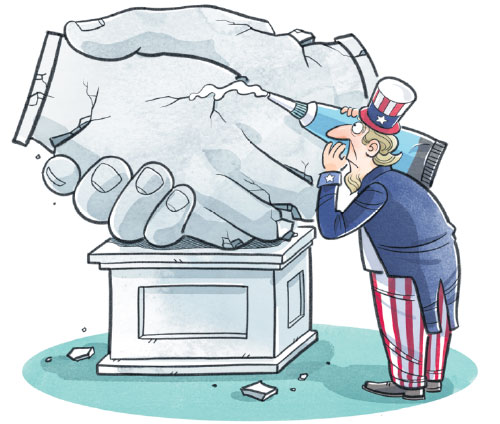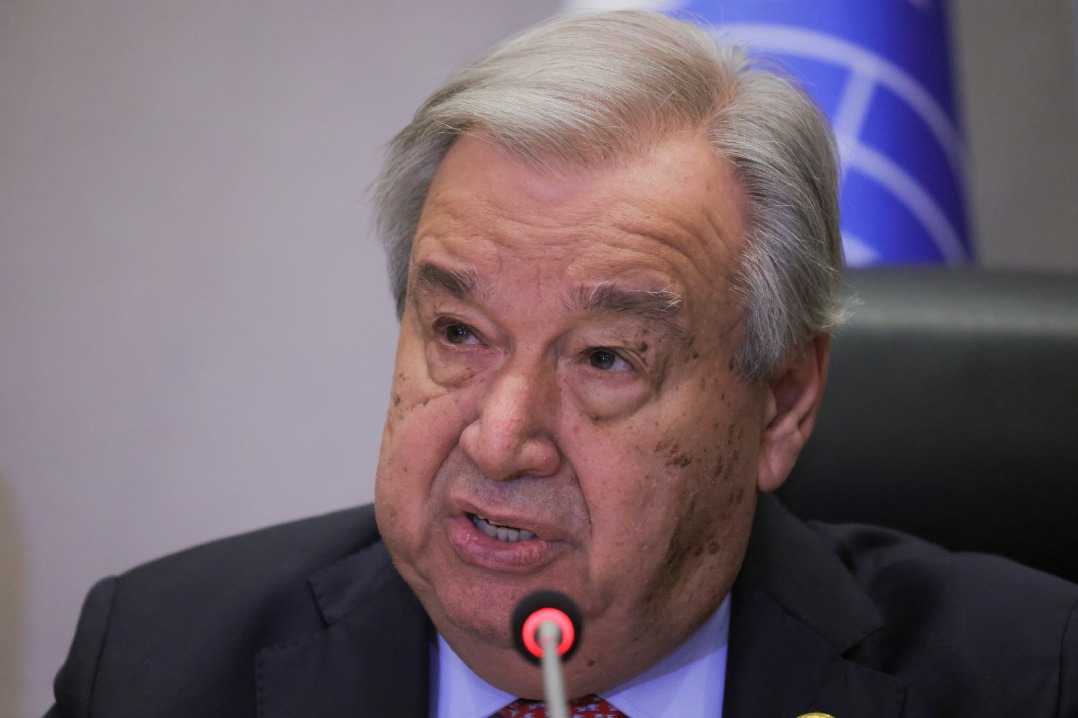US maneuvering in the South Pacific
By Chen Zinan | China-US Focus | Updated: 2021-09-18 16:30

Kurt Campbell, the coordinator for Indo-Pacific affairs on the US National Security Council, said of the island nations of the Pacific: "Increasingly, again, this is an arena of competition both in terms of values, their role at the United Nations, their health challenges, climate change, their potential role militarily, healthy fishing stocks — just down the list." The Biden administration then made a number of moves in the region, targeting the expansion of Chinese influence. This diplomatic offensive culminated in August with the first video appearance and address by a US president at the Pacific Islands Forum.
The Biden administration's view of the South Pacific as an arena of competition indicates that the US has raised the competition over Pacific Island nations to a new strategic level, but it also reflects the real crisis facing the US and other Western countries in the region. The starting point of the US policy may be the following:
First, the United States sees the geopolitical value of the Pacific Island nations. These countries are transportation hubs that lie along the main sea routes in the middle of the second and third island chains and are useful to the US against China. In the context of the China-US strategic competition and the Biden administration's continued push to focus diplomatic and military resources on the Indo-Pacific, the South Pacific region has gradually become the front line of Sino-US competition, and its geopolitical importance has become more prominent.
Second, China is promoting economic and trade cooperation with Pacific Island countries. These countries may be characterized as small islands, large oceans and underdeveloped economies, but they have rich resources in their exclusive economic zones and greater development potential in infrastructure, energy and agriculture. China and the Pacific Island countries can complement each other, engage in open cooperation and share development. Under the Belt and Road Initiative, the two sides have achieved remarkable results in cooperation in economy and trade, infrastructure, tourism and education, which have strongly contributed to the development of the economies and the improvement of island people's lives.
China has also warmed up its diplomatic relations with the island countries, establishing diplomatic relations with the Solomon Islands and restoring diplomatic relations with Kiribati. Eleven Pacific Island countries, including Papua New Guinea and Fiji, have signed memorandums of understanding on cooperation under the Belt and Road Initiative.
Finally, the political interference of Western countries has caused discontent. The United States has always regarded the Pacific Island countries as within its sphere of influence, and its allies, including Australia and New Zealand, have long monopolized regional affairs through mechanisms such as the Pacific Islands Forum.
But in February this year, five Pacific Island nations — the Federated States of Micronesia, Palau, the Marshall Islands, Nauru and Kiribati, withdrew from the Pacific Islands Forum because of dissatisfaction over Australian interference in the election of its secretary-general, triggering a high degree of concern and vigilance in the United States and other Western countries.
In this context, the US began to condescend to get more involved in regional affairs and highlighting competition with China in an attempt to quickly restore regional order and achieve the effect of gathering lost sheep.
The latest developments suggest that the Biden administration may focus on the following three areas to reinforce its view of an arena of competition with China.
Developing foreign affairs issues. In terms of regional governance, first of all, the Biden administration will work to calm the grievances of the countries in the region and to recover political points lost. Campbell explained: "These are islands which we have enormous historical, moral and strategic interest in, and sometimes we forget that."
He also promised: "So one of the things that we are looking to do over the course of the next little while, working closely with allies like Australia, New Zealand, Japan and others, is to convene with Pacific Island nations to talk about arenas of common purpose."
US National Security Adviser Jake Sullivan spoke by phone with the ambassadors of Pacific Island nations, emphasizing the need to broaden regional engagement, deepen diplomatic ties and work together on issues such as climate change, the COVID-19 epidemic, illegal fishing and maritime security. On climate change, Secretary of State Antony Blinken pledged to provide Pacific Island nations with experts, technology and more investment to boost the resilience of related countries in areas such as infrastructure and agriculture.
In addition, the US will focus on hedging against China's so-called vaccine diplomacy by increasing the number of personnel and the scale of funding in the countries concerned through agencies such as the US Agency for International Development. President Biden has also pledged to donate vaccines to countries in the region with no strings attached.
Raising economic development standards. Blinken warned leaders of Pacific Island countries about "threats to the rules-based international order" and "economic coercion." He proposed that regional investment and development should meet three main standards: economic and social sustainability, openness and transparency and autonomous decision-making — a veiled swipe at China's Belt and Road projects.
In addition, Western media continue to speculate that Papua New Guinea is mired in the "Chinese loan quagmire" and that China's airport and port construction projects on Kiribati's Canton Island are designed to seize strategic positions in the Pacific, again smearing China through public opinion.
Because of US political interference and pressure, Chinese companies' participation in the Pacific submarine fiber-optic cable project and the Samoa port construction project was recently put on hold.
Emphasizing deterrence in maritime security. On the maritime policing front, the United States has boosted the scale of its Coast Guard forward deployments in the Western Pacific, including the deployment of patrol vessels in Guam and American Samoa. For the first time, the US has stationed Coast Guard officers at the US embassy in Australia, under pretext of countering any expansion of Chinese fishing vessels, maritime police and Navy in the South Pacific.
The US even hopes to explore the use of joint coast guard patrols and joint law enforcement (with US law enforcement personnel on board) to guide law enforcement activities such as dispersal, hot pursuit and the boarding and inspection of China's oceangoing fishing vessels in South Pacific waters — all this to enhance the Pacific Island countries' awareness of maritime developments and their ability to carry out "rights defense operations" in a short period of time.
On the naval front, the chief of the US Indo-Pacific Command proposed to Congress the establishment of a precision strike combat network capable of withstanding enemy attacks in the first island chain of the western Pacific, the deployment of tactical multifunctional radars in the Pacific Island nation of Palau and the establishment of multiple joint training bases in various locations to strengthen conventional deterrence against China.
Recently, when the President of Palau visited the Washington and met with US Secretary of Defense Lloyd Austin, the two sides began discussing the need for US forces to be stationed in Palau and their deterrent effect on China.
All this suggests that the Biden administration's notion of an arena of competition still has not broken out of a zero-sum game mentality. It starts from US interests, rather than from the needs of the island nations. Its intention is to break rather than construct.
The political containment, economic containment, military deterrence and other actions of the United States are obviously meant to counter Chinese moves. In the short term, they may cause some ripples in the South Pacific region, but in the long run they will not contribute to development. They will ultimately come to nothing.
The author is an assistant researcher at Maritime Strategy Studies, CICIR.
The opinions expressed here are those of the writer and do not necessarily represent the views of China Daily and China Daily website.
If you have a specific expertise, or would like to share your thought about our stories, then send us your writings at opinion@chinadaily.com.cn, and comment@chinadaily.com.cn.
























